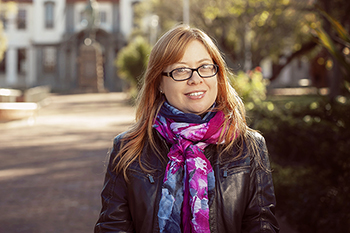Latest News Archive
Please select Category, Year, and then Month to display items
17 August 2020
|
Story Nitha Ramnath
|
Photo istock

Within the next five years, 60% of the world’s population will be living in urban areas. Urban living comes with large-scale economic advantages and society benefits from economies of scale. But, COVID-19 is challenging urban living. We have introduced the term ‘social distancing’ and some policy analysts have even argued for the de-densification of cities.
Join us for a discussion where our panellists will analyse this perceived conflict.
Date: Thursday, 27 August 2020
Time: 14:00 to 15:30 (South African Standard Time – GMT +2)
Please RSVP to Elelwani Mmbadi at
mmbadiE@ufs.ac.za no later than 25 August, upon which you will receive a Skype for Business meeting invite and link to access the webinar.
Speakers:
Prof Ivan Turok
Dr Geci Karuri-Sebina
Mr Thiresh Govender
Moderator:
Lochner Marais
Leading African Studies scholar to represent UFS as research fellow at Leiden University
2016-03-10

Dr Stephanie Cawood to devote three months at the African Studies Centre Leiden as a visiting research fellow to further her research on the rhetorical imprint of Nelson Mandela.
Photo: Supplied |
Dr Stephanie Cawood, Programme Director and Senior Lecturer at the University of the Free State (UFS) Centre for Africa Studies has been offered a visiting research fellowship to the African Studies Centre Leiden (ASCL) at Leiden University in the Netherlands. The ASCL is entirely devoted to the study of Africa transcending multiple faculties and is known for its extensive library.
As a visiting research fellow from April to June 2016, Dr Cawood looks forward to expanding her network as well as intellectual horizons with the broad spectrum of knowledge archived by the ASCL. “Working so closely with the scholars at the African Studies Centre Leiden will enrich my research and broaden my international footprint as a scholar,” Dr Cawood says.
Her research at ASCL follows on her doctoral research on the former president of South Africa, Nelson Mandela’s rhetorical imprint, and will explore the conceptual, cultural, ideological and historical influences that shaped the thought and rhetoric of Nelson Mandela. She is particularly interested in studying the intertextual dynamics in Mandela’s rhetoric with historical figures such as Jawarharlal Nehru, Martin Luther King Jr and Winston Churchill.
According to Dr Cawood, this research “will deepen the understanding of Nelson Mandela’s rhetorical journey from struggle to liberation and unpack the various influences that made him the political figure he ultimately became.”
During her tenure at Leiden University, Dr Cawood will prepare a manuscript to be published by the ASCL as a working paper and also present seminars.